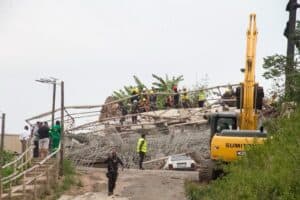However, he also acknowledged that men also fell victim to the crime across the board, adding that trafficking happened for a number of reasons.

Women and children were reportedly at the top of the list of all victims of human trafficking, government revealed during a press briefing in Pretoria last week.
“Women make up 49% and girls 23% of all victims of trafficking,” deputy justice and constitutional development minister John Jeffery said.
However, he also acknowledged that men also fell victim to the crime across the board, adding that trafficking happened for a number of reasons including sexual exploitation, forced labour, begging, marriage, child soldiers and for the removal of organs.
“Sexual exploitation is the most common form of exploitation (59%), followed by forced labour 34%,” Jeffery said.
“Most victims are trafficked within their country’s borders and those trafficked abroad are moved to the riches countries.”
Jeffery made the revelations as he launched training manuals on the prevention and combating of trafficking in persons (TIP).
“TIP is a global problem that has plagued many countries and accounts for the highest proceeds of crime after drugs and arms trafficking,” he said, adding it was not only a serious crime but also a grave violation of human rights.
“Every year, thousands of men, women and children fall into the hands of traffickers in their own countries and abroad, and South Africa is affected by TIP as it has been found to be a country of origin, transit and destination of trafficking victims.”
Jeffery also indicated that there were challenges prosecutors and law enforcement agencies faced to combat TIP which were referred to as “modern-day slavery”.
“Prosecuting cases of TIP can be a difficult task for law enforcement officials due to the clandestine nature of the crime – cases are not always reported as victims of trafficking are often cowed into silence by offenders and the general public may not be aware of their plight,” he said.
At times, tragically, victims were mistaken for the perpetrators themselves and faced punishment instead of being offered assistance.
“The need for training remains critical to improve the criminal justice capacity to successfully prosecute TIP,” he said.
“TIP is a transactional crime – it crosses state borders and jurisdictions and it can also occur domestically, within national borders.”
Jeffery further explained that TIP was reportedly best understood as a collection of crimes bundled together, instead of a single culpable act; a criminal process instead of a criminal event.
“The need to conduct investigations or pursue criminals across international borders renders the work of prosecutors and law enforcement agencies particularly challenging,” he said.
He said there was international consensus that a right-based approached was necessary to prevent and combat trafficking.
“A human rights-based approach is a conceptual framework based on international human rights standards that is operationally directed to promoting and protecting human rights,” Jeffery said.
He added that it required an analysis of the ways in which human rights violations arose throughout the trafficking cycle and the government’s obligations under international human rights law.
“It needs to identify and redress the discriminatory practices that underlie trafficking that maintain impunity for traffickers and deny justice to their victims,” he said.
This article first appeared on Rekord and was republished with permission.
For more news your way, download The Citizen’s app for iOS and Android.






